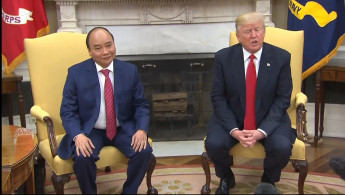Trump expected to leave Paris climate deal
“I’m hearing from a lot of people both ways,” Trump told reporters as he welcomed Vietnamese Prime Minister Nguyen Xuan Phuc to the White House. He said he’d be announcing his decision “very soon.”
Leaving the deal would fulfill a central campaign pledge but would anger international allies who spent years in difficult negotiations that produced an accord to reduce carbon emissions.
Trump faced considerable pressure to hold to the deal during visits with European leaders and Pope Francis on his recent trip abroad. The president and his aides were finalising the details of a pullout, an official said, insisting on anonymity to discuss the decision before an official announcement.
While Trump currently favors an exit, he has been known to change his thinking on major decisions and tends to seek counsel from a range of inside and outside advisers, many with differing agendas, until the last minute.
A second White House official, who was not authorised to discuss private conversations and also insisted on anonymity, said Trump had not made a final decision on how to proceed.
Trump’s top aides have been divided.
He was to meet later Wednesday with Secretary of State Rex Tillerson, who has favored remaining in the agreement. Chief strategist Steve Bannon supports an exit, as does Environmental Protection Agency administrator Scott Pruitt. Senior adviser Jared Kushner generally thinks the deal is bad but would like to find a way to see if US emissions targets can be changed.
Trump’s influential daughter Ivanka Trump’s preference is to stay, but she made it a priority to establish a review process so her father heard from all sides, said one of the officials.
Nearly 200 nations, including the United States under President Barack Obama’s administration, agreed in 2015 to voluntarily reduce their greenhouse gas emissions in an effort to combat climate change. Withdrawing would leave the United States aligned only with Russia among the world’s industrialised economies.
A senior European Union official said the EU and China would reaffirm their commitment to the pact regardless of what Trump did, and would spell out, during talks on Friday in Brussels, how they would meet their obligations. The official, who is involved in preparing the meeting between EU officials and China’s premier, was not authorized to speak publicly and discussed the matter on condition of anonymity because the meeting statement was not finalised.
Trump claimed before taking office that climate change was a “hoax” created by the Chinese to hurt the US economy, an assertion that stands in defiance of broad scientific consensus.
But Trump’s chief White House economic adviser, Gary Cohn, told reporters during the trip abroad that Trump’s views on climate change were “evolving” following the president’s discussions with European leaders.
Still, he said that the carbon levels agreed to by the prior administration “would be highly crippling to the US economic growth,” and said that, if the president had to choose between limiting carbon and economic growth, “growing our economy is going to win.” Supporters of the deal say it’s not an either-or choice.
What is not yet clear is whether Trump plans to initiate a formal withdrawal from the Paris accord, which under the terms of the agreement could take three years, or exit the underlying UN climate change treaty on which the accord was based.
Scientists say that the earth is likely to reach more dangerous levels of warming even sooner if the US retreats from its pledge because America contributes so much to rising temperatures. Scientists suggest dropping out could result in emissions of up to 3 billion tonnes of additional carbon dioxide a year — enough to melt ice sheets faster, raise seas higher and trigger more extreme weather.
The US is the world’s second-largest emitter of carbon, following only China. Beijing, however, has reaffirmed its commitment to meeting its targets under the Paris accord, recently canceling construction of about 100 coal-fired power plants and investing billions in massive wind and solar projects.





 Follow the Middle East's top stories in English at The New Arab on Google News
Follow the Middle East's top stories in English at The New Arab on Google News

![Israeli forces ordered bombed Gaza's Jabalia, ordering residents to leave [Getty]](/sites/default/files/styles/image_330x185/public/2176418030.jpeg?h=a5f2f23a&itok=_YGZaP1z)
